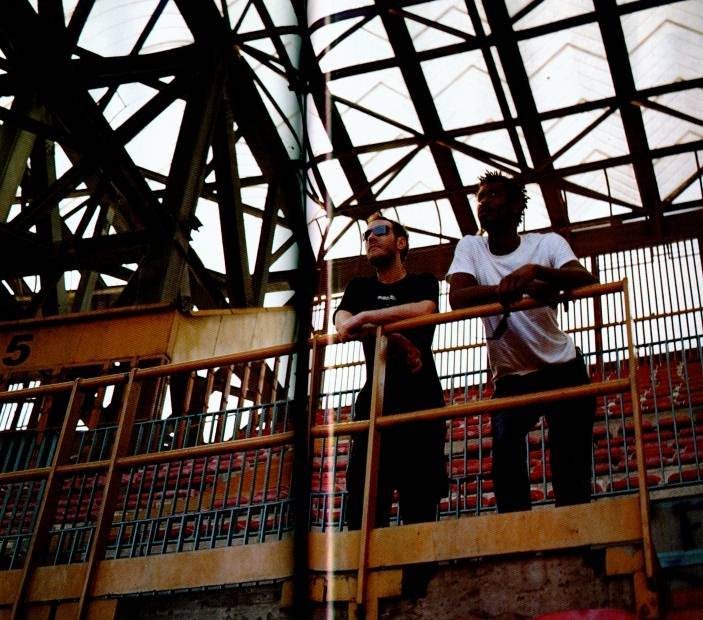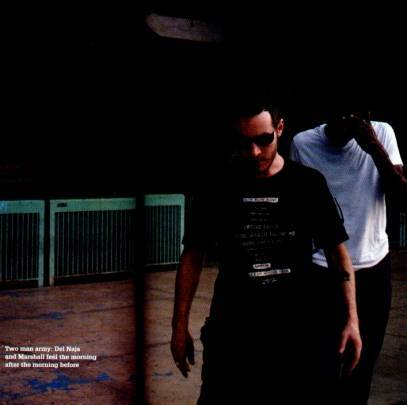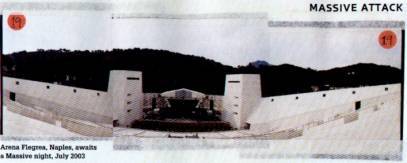Massive Attack talk paranoia, fear, big brother and fine wines in the shadow of Mount Vesuvius.

It wasn't meant to be like this...
Dawn breaks early over the only half-decent bit of beach in the bay of Naples, and a significant minority of the 40-odd folk that make up the Massive Attack touring party are wondering how to get home. For the past six hours they have drunk, smoked and generally enjoyed themselves like there was no tomorrow. Then tomorrow became today, and today, in touring parlance, is a "show day". Before the sun sets again they will deliver to 6,000 Italian fans a faultless gig that bears no traces of its performers' nocturnal exertions. Then it's back to the beach, more of them this time, to pick up where they left off - not that things had ever really stopped. No, it wasn't meant to be this way at all.
The current, if superficial, media consensus is that Massive Attack are a band who release progressively "darker" albums, who take an active political stance in an increasingly apathetic art form and operate somehow amidst an internal atmosphere of creeping paranoia and internecine rivalry.
A climate not helped, one imagines, by the recent completely disproved but nonetheless very public accusations linking Robert "3D" Del Naja - at times the band's only member in the traditional sense of the word - to the police's vast internet paedophile swoop, Operation Ore.
I had no more expected to find them living it up on beaches at daybreak than I would have expected to have found them riding unicycles and singing "Eye Of The Tiger". Which goes to show how wrong you can be. The "good times" ethos that sustains Massive Attack on the road (if not always on record) is unsurprising if you consider their origins.
To think of them as a band is to misunderstand their evolution since their earliest days as a Bristol sound system at the end of the Eighties. Today Del Naja is quite happy to refer to them as "more of an idea than a band", but whatever the components and people that form that notion, something of the original "play some records, sell some beer and get down" ethic abides. The surprise is that it has survived so many changes in personnel and such extremes of circumstance.
Del Naja, the one constant at the heart of the collective, is an unlikely pop star. He is short, edgy, manic, slightly feral round the edges but fundamentally energetic and commendably pale for someone who has been touring places far warmer than Britain for six months. You wouldn't recognize him. This is probably a conscious thing. By his own admission he has sought to prevent his own image obscuring the considered presentation of the band, the sleeves and videos for which he also takes responsibility.
Visually, the difference between him and Grant "Daddy G" Marshall is almost comic. Grant is at least six foot five, relaxed, and immaculate, a man who, though by no means withdrawn, you suspect receives far more than he transmits. Legend has it that relations between the two were such that on completion of the latest album, 100th Window (on which Robert was the only original member involved) Grant, taking a sabbatical, signalled his absent approval of the record to his old friend only via text message.

Under the shadow of Vesuvius on a burning blue afternoon, such tensions are
clearly forgotten. Grant is back on tour "because I missed it really, I
missed the studio, the whole thing". An outfit that has sustained the arrival
and departure of such diverse talents and personalities as Tricky, Nellee Hooper,
Andrew "Mushroom" Vowles, Shara Nelson et al is clearly more elastic
than most. The door swings both ways. On the afternoon after the pre-show party
that was the night before, the two of them seem very much at ease. Remarkably
so, even.
"Apart from that recent
history of me and G, the whole point of the band has always been to have fun,"
says Robert, at a pace that belies the West Country accent that drenches his
vowels. "It goes back to when we started with sound systems that didn't
really make any money. We would pay for the generator, the PA. I'd do the artwork
then go to the copy shop, cut and crop all the flyers myself, buy beer from
a wholesaler and sell 'em out the back of a car. It was a really good crack.
"The only reason we
went into the studio in the first place was to make dub plates, to do what the
reggae sound systems were doing and put our own backing tracks together. That
was the only reason we entered a professional environment. There was never any
ambition or desire for fame and fortune, it was something that happened alongside
it.
"Even though your priorities
change - you get older, money does become an issue - the desire to have a laugh
and make music in the way we always have done is still there, I think. It's
always experimental, it's always open-ended. We did parties and gigs and had
problems and disappointments, and it's the same in the studio. There's days
and weeks when things don't work out, and that can be really upsetting. The
whole point is to have a creative outlet and if it isn't doing that then you
feel stifled and frustrated, obviously. But it's all about fun, and the tour
continues that. And I think the same in the studio. It's always been non-egocentric.
The most personality battles are between me and G, but we've known each other
17 years."
Lest we forget, selling beer
from the back of a car and all the rest of it led to the release of Blue Lines.
An album which, along with Soul n Soul's Club Classics, The Stone Roses' debut
and Primal Scream's Scieamadelica defined a unique, remarkable era in British
music, and continues to inform and influence music to this day.
Subsequent releases have
been taken to heart by the mainstream (in particular those in search of backing
music for television, "mainly programmes on serial killers," says
Robert) to the extent that it's possible to misjudge Massive Attack today as
one of those bands that are simply there. In truth they have always been coming
from their own angle, and that is their real consistency.
"I think we always did
that," says Robert. "Every time we brought out a record it was the
exact opposite of what everyone else was doing. When we brought out Blue Lines
everyone was raving. The same during Protection. When Mezzanine came out everyone
in Bristol was doing drum 'n' bass."
Did you set out to do that?
"It's not strategic, we've always done what we want to do. I think all
musicians are self-indulgent."
"So you'll admit that
you're self-indulgent!" says Grant, as if to resume some age old dispute.
At which Robert cracks what's best described as an amiable "fuck you"
smile.
"It's always been a
bit subversive, what we do, in our minds," adds Grant. '"Cos we live
in our own world."
In February of this year,
Massive Attack's own worldfaced its sternest test yet. Along with 7,300 others,
Del Naja's (who at that time was Massive Attack) name was passed to the British
police by American authorities for investigation as part of the aforementioned
Operation Ore. Confident of his innocence, he handed his computer equipment
over to the police. Then in a move that, though illegal, is increasingly commonplace,
someone in the police informed the media, in this case the Sun. Never one to
be thwarted in her quest for arbitrary justice, the paper's editor Rebekah Wade
named him in the paper.
Already "the most paranoid and conspiracy-minded person I know", Del
Naja thus embarked on what he has since referred to as "the worst period
of my life". 100th Window is an album rife with references to surveillance
and the curtailment of liberties.
"Suddenly it seemed like a self-fulfilling prophecy," he says.
Having toyed with disappearing
f' view, he chose to carry on in spite the allegations and commenced the tour.
By the end of March his equipment was returned, the police admitting there was
no evidence of any kind. The likely explanation is that he was unfortunate enough
to have visited a site owned by a company that also owned illegal ones. But
the damage gets done.
He has said since that, "when I leave the house I feel as though there's
a huge arrow over my head.. now I walk into a shop or pub and I can't really
be myself. I have to look everyone twice in the eye." It is an experience
few could walk away from unscathed, if at all. Understandably is not one that,
now that it is behinc;him, he is eager to discuss. When the subject does arise,
I venture in sympathy that, like Lee Harvey Oswald, he has been a victim of
someone else's darker schemes.
"Wait, wait, wait a
second," says Grant, all serious, "you're saying the Oswald didn't
kill Kennedy?" and they both start laughing. Clearly the Massive Attack
world, though rattled maintains its orbit.
"If someone had told
me at the start of the year what was gonna happen..." says Robert...
"...You'd have said
they were having a laugh," ventures Grant.
"I'd have told 'em to
fuck off," concludes Robert.
As the conversation moves
on, Del Naja, who has emerged from his recent history with instincts for enjoying
life enhanced, if anything, makes repeated references to his own cynicism. I
argue that this cannot be absolutely true - if one were truly cynical, why bother
making music in the first place? At its heart, one imagines, it is essentially
an optimistic activity, no matter what its ultimate tone.
"It's twofold,"
he says. "I was thinking yesterday about starting new stuff in the studio
and making lists in my head, and all those things are exciting and positive.
I'm looking forward to it, so it has an optimistic viewpoint entirely. But I
think that's countered entirely by things like, I did an interview with this
guy and he said, 'Is your music getting darker?' I said that's such an overused
word, what does it really mean?
"My point was that the
world in general is
getting darker. With the amount of surveillance we're under, the new American
corporate century we're about to enter, it's a very frightening place. Media
organisations are allowed to monopolise, they can own newspapers, radio and
TV stations and all have political interests. It's dangerous especially if you're
trying to put something out that's not just a hair product, a T-shirt or a chocolate
bar, you're trying to do something creative.
"And that goes for writers,
musicians, artists, film-makers... it's gonna get much, much harder. The whole
idea of our music getting darker is ridiculous. The issue is the media in general.
The media's selling you a lifestyle, when the world is in a precarious position.
Obviously, the idea of selling a lifestyle only works if you can sell a happy,
healthy lifestyle and to do that you have to pretty much ignore what's going
on.
"If you wanna sell this season's look, these sunglasses," indicating
items on the table, "that food, that wine, that product, it has to be sold
in a certain way that leaves no room for anyone to be honest."
Does the mixed reception
of 100th Window reflect that?
"Of course, 'cos people
don't wanna deal with that sort of reality. And with us putting a record out
which is very much reflective of life, of how the people in the W organization
were feeling, it's not a very cool place to put music out at the moment. I think
other bands will continue to suffer from that."
You could, I venture, argue
much of the British media exists in a climate of near oppressive, jollification,
as if to offset reality.
"Democracy doesn't have
to be sold as capitalism," he says. "I think in Britain we're losing
that edge. There's far more awareness and protest here in Europe. It's like
hip hop, when it came out I loved it! It was what punk was, the idea that it
came from a community who had to fight for their survival. Now they've been
absorbed by an industry that uses it every time you see an ad on TV and every
hip hop video and song is selling lifestyle and product. It's selling the American
dream, more so than country and western music."
It all rings true, but surely
here in the sunshine by the sea, entrenched in fine wine and good food we can
take this conversation to a more positive conclusion?
"Naples is a very superstitious
place," says Del Naja, whose family hail from hereabouts. "Southern
Italians are very warm, honest people, they distrust the north, the industrialists.
And living in the shadow of Vesuvius, the fact it could erupt any second while
people seem to build higher and higher up the mountain, they also have this
attitude to life that's 'enjoy it while it lasts'. If it erupts, so be it. Enjoy
what you've got.
"They're not afraid of celebrating life and death and acknowledging it,
like we are in Britain. Where again, in order to
Democracy doesn't have to
be sold as capitalism"
subscribe to this happy lifestyle
you can't really deal with death. Death is old people's homes and funeral parlours,
wills and testaments. You can't celebrate it, you can't acknowledge it. Whereas
in Italy it's the opposite. It's not tribal, but there's more honour and love
and dignity with regard to getting old. It's a more honest way of living."

That evening, Massive Attack's schism between consciousness and celebration
is demonstrated to sublime effect in a gig that combines both elements to near
perfection. The songs (in which Grant and Robert are abetted by Horace Andy,
Dot Allison and a host of lesser-known but equally accomplished performers),
which range in scope from "Unfinished Sympathy" to the less familiar
territory of 100th Window, are backed by a visual display that almost defies
description.
A huge video screen delivers a living light show of constantly regenerating
text in the local language. News updates scroll to the beat, political headlines
swirl and diffuse, weather forecasts are graphically equalised, all in real
time. The effect (one imagines) is something like smoking DMT and watching Ceefax.
Unpleasant though that may sound, it's a stunning accompaniment to the music,
which lifts the whole enterprise to another level. Later still, back on the
beach at dawn again Del Naja sits on a deck chair and laughs.
"Missed yer fuckin' cab home now, aintcha?"
Indeed, but as we now know, there are many worse places to be stuck than under
the volcano.
Story by Michael Holden
Photography by Warren Du Preez and Nick Thornton Jones








